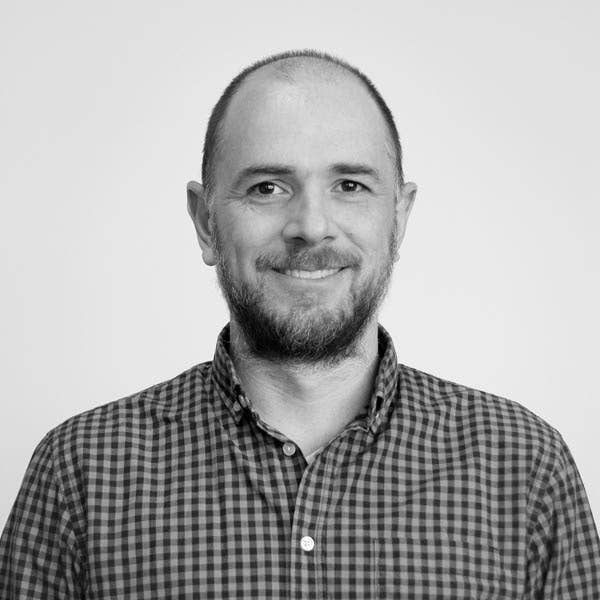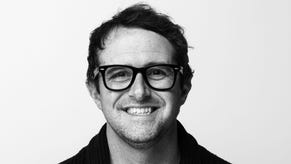Journey to the Savage Planet and an adventure in optimism
Typhoon Studios co-founders Alex Hutchinson and Reid Schneider describe the vision for their indie game, and how it will stand alongside AAA titles
Last night at The Game Awards pre-show, Typhoon Studios co-founder Alex Hutchinson was the embodiment of optimism.
He appeared alongside host Geoff Keighley after showing a teaser trailer for Typhoon's upcoming adventure game, Journey to the Savage Planet. The trailer was scant on gameplay details but heavy with wacky sci-fi vibes and a sense of eager, naive adventure. According to both Hutchinson and fellow co-founder Reid Schneider, those feelings alone are how they want the game to be perceived for the time being.
"We're trying to make a more personal game," Hutchinson said. "We're a studio of 23-25 people, and we're trying to make sure that we all have our hands in the content as much as possible and that it really is a strong and unique flavor that you wouldn't get from one of the big studios. It's a pulpy, sort of hopeful science-fiction adventure game where we send players to their own little bespoke planet where they get to explore, survive, catalog the flora and fauna that are there, and hopefully uncover all the secrets and mystery of this strange new world."
Journey to the Savage Planet looks to be another in a small but growing niche of games straddling the line between AAA and tinier indie studios. These games usually come with mid-sized budgets, aim for higher production values, and attempt to carefully restrain their scopes.
Hutchinson, Schneider, and many other members of the team at Typhoon Studios are coming to this smaller adventure with years of AAA experience, which both co-founders said has necessitated shifts in mindsets as they begin work on their game.
"There's always a fantasy that when you start something, you get a blank piece of paper and infinite money and the first project you'll launch is your dream project," Hutchinson said. "Everything we're doing, we're excited to do, but we're still constrained by reality in many respects."

"When we started the studio, there were a lot of things we had to think about differently from how you'd think about them in a AAA," Schneider continued. "For example, when you have these large AAA studios, by nature of the fact that you've got hundreds of people working on them, you end up with this hyper-specialization. 'What do you do?' 'I make the grass,' or 'This guy makes the trees.' But we really need people who think of everything in more of a general and holistic sense.
"It's no longer about one guy who does trees and one guy who does grass. If we have an artist, they could be doing concept, models, textures, everything from start to finish. That takes a special type of person. It's easy when you're in a larger company to say, 'This is the thing I do, I do it super well, and everything else is scary and there are dragons there.' But the people who we're excited about are the people who want to get back to having their hands dirty in all parts of the production."
"Hiring well" was a topic that came up multiple times during our interview, with Hutchinson saying it was the most important aspect of striking out on their own as a new indie studio. And it appears that at least in terms of experience, they have hired well. The vast majority of Typhoon's employees joined the studio from places such as Warner Bros, Ubisoft, and EA - unsurprising choices given Hutchinson's former role as creative director at Ubisoft and Schneider's work as executive producer at both WB Montreal and EA.
"Everything we're doing, we're excited to do, but we're still constrained by reality in many respects"
Alex Hutchinson
"Both Reid and I have been doing this around 15-20 years," Hutchinson said. "If you'd asked me when I started what I imagined game development to be, it would've been a version of, 'A bunch of people with different abilities getting together in a room and talking about a game, then trying to make it.' It was a very naive way to look at it, because as Reid said, you end up realizing all the different job roles that you need. But this is the first time where I feel like we're living that naive fantasy of everyone in one room, and everyone saying, 'What can I do today to make the game better?'
"That means people reach beyond their comfort zone sometimes, learn new skills. Reid does HR, I'm writing the script and working on marketing materials, and it's fun. It really is just trying to find the best use of your time to make the best games."
"My Microsoft Excel skills have gone through the fucking roof," Schneider added. "This was never my goal. But it's whatever has to get done. All the money we bring in, whether it's from investors or our publisher 505 ["or ourselves," Hutchinson added], it all goes to the game. We run light. We have no admin."
"Everyone is actually making the game," Hutchinson concluded.
While the team's job descriptions have gotten broader in the move to an indie studio, the game itself they're making has gotten more specific than the team is used to. For Hutchinson and Schneider, that means getting rid of a lot of "extra" features that AAA games seem to always have that are not important to Journey to the Savage Planet, in order to focus on making what's actually there high-quality.
"The AAA experience is both broad in tone and broad in content," Hutchinson said. "AAA by definition is going to be relatively contemporary, relatively grounded, relatively believable, because you need to be to capture a big audience. As soon as we go hyper-genre, we're carving out a unique space where we're not going to compete one-to-one against any of these huge games that have a bigger budget and team. We're sci-fi, we're very much more in the fiction side of science fiction, we're optimistic, we're upbeat, we like the idea that we can leave reality behind to allow us a gameplay space that's fresh and fun, whereas if I'd been at an Ubisoft or an EA a lot of time they want it more grounded.
"I think we can still offer roughly the same level of quality as segments of that game - we're not going to be doing a PvP experience at all, which means that whole chunk of development is something we don't have to spend money on, so our small team is punching above its weight...Or in terms of story, we don't want to tell a big linear story, so that means we can cut our cinematics budget down massively, and the amount of script required is much less."

"It also means that we can really invest in gameplay systems that are going to give the player more bang for the buck and are just more fun," Schneider added. "The Uncharteds of the world, those are awesome games. But it makes zero sense for a small, independent company to say, 'Let's go beat that.' What we really need to think about is how to make something that's fun, unique, and interesting. Hellblade is a great example of that."
"It's focused," Hutchinson concluded. "It's a much shorter experience than a AAA, but second-for-second, it could sit alongside them."
Now untethered from AAA studios, Hutchinson has spoken in the past about the struggle to market an indie and get the word out to the right people. The Game Awards announcement was one way the studio is trying to make a big splash on entry into the industry, but finding a good publisher was another one. The two told me that in looking for a publisher, the most important thing to the team was keeping ownership of their IP, and the studio was fortunate enough to have multiple offers before it came to an agreement with 505 Games.
"The worst possible version of the future would be to leave the financial stability of a big studio, start your own project, and then end up in a low-paid version of your old job where you didn't actually own the things you were making," Hutchinson said. "It's important for us that if we're going to take all this risk then the potential to create something that was special to us and eventually special to an audience was something we could retain control over."
"The worst possible version of the future would be to leave the financial stability of a big studio...and then end up in a low-paid version of your old job where you didn't actually own the things you were making"
Alex Hutchinson
Journey to the Savage Planet's trailer at The Game Awards didn't show any gameplay, and the game is slated for release in 2019. Hutchinson and Schneider feel they are currently on schedule, and said they were focused on getting the game to an alpha build as soon as possible.
"Our bet was that if we could hit an alpha as early as possible, this is what would give us an ability to take a holistic look at the game and say, 'What's good and what's crap?'" Schneider said. "Generally, nothing is really great on the first shot and it just requires iteration."
"Because everyone is hopeful and optimistic, you tend to overpack your schedule," Hutchinson agreed. "And no one likes to cut things because they think it's going to lower quality, so you tend to run up really hard against your alpha date, and if that alpha date is right at the end of your project without much wiggle room, you lose your chance to edit intelligently, you lose your chance to polish, and sometimes you end up with things that are screamingly obvious after release that you could have fixed with even a couple of weeks, that you just didn't have enough time to get to."
Though it clearly has some downsides, the hope and optimism at Typhoon was another topic that came up repeatedly in our conversation. Hutchinson and Schneider told me that this optimism is pervasive throughout their development team, and is a key feeling they want to get across in their game both to make it stand out, and because they themselves value it as creators.
"It's not retro at all, but Journey to the Savage Planet has this tone of sort of early science-fiction of hopefulness, that you should journey beyond earth for adventure and because it's humankind's mission to grow and explore and all these nice feelings, and not escaping a nuclear winter or disaster," Hutchinson said.
"I miss the blue skies of the Sega games of my youth, where you'd boot up your Genesis or Mega Drive and it would always be that cerulean blue that would kick in, whether it was Sonic or whatever of those games. They always felt positive and happy and warm. I'm sick of the greys and browns and negativity, so I felt if we were going to make something new, let's be a voice for good."







.jpg?width=291&height=164&fit=crop&quality=80&format=jpg&auto=webp)

